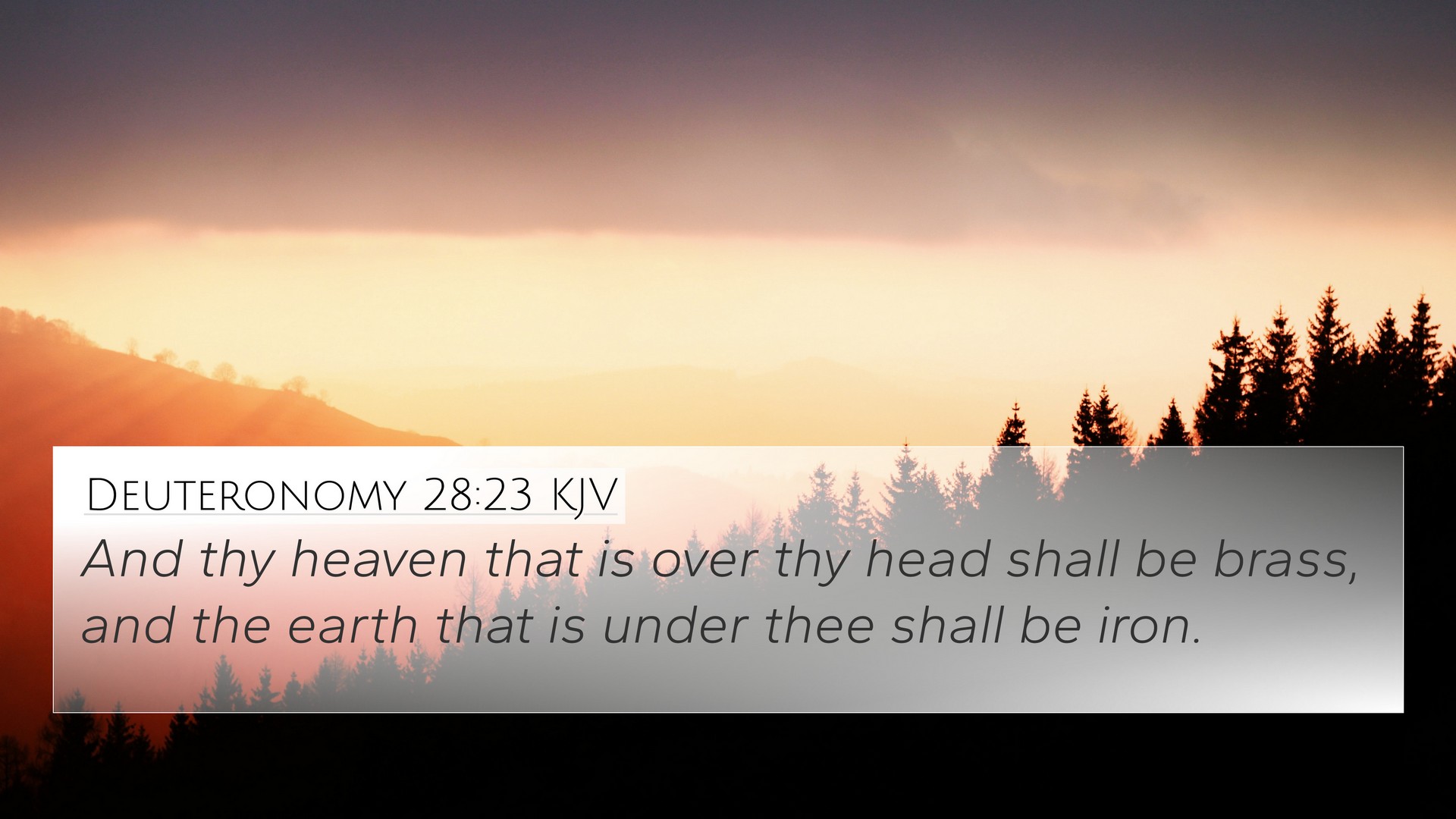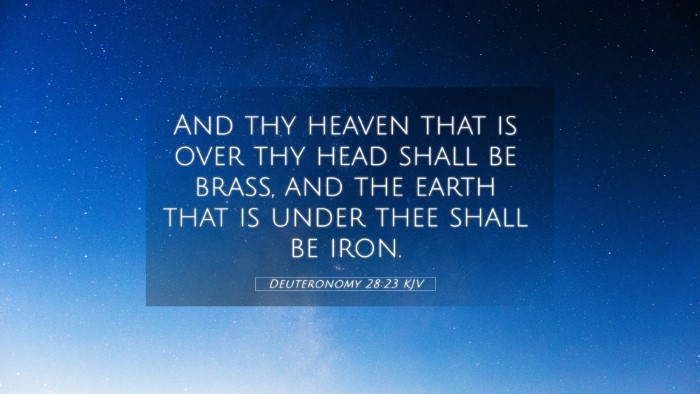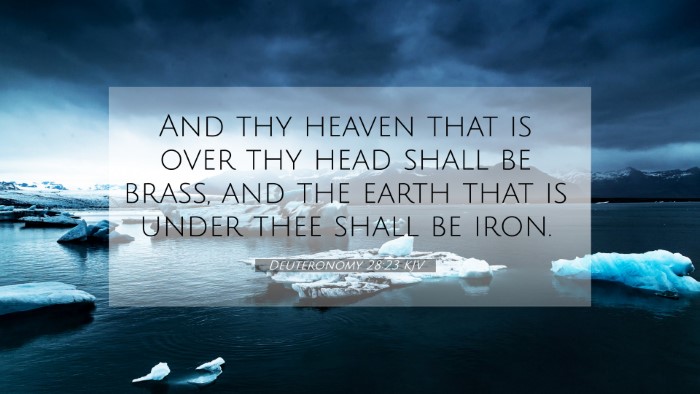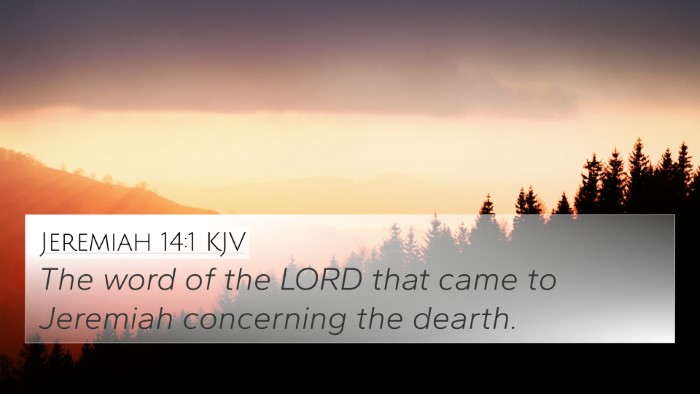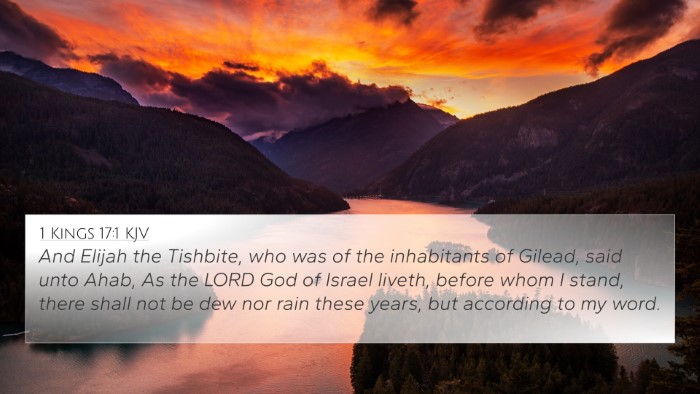Understanding Deuteronomy 28:23
Verse: "And thy heaven that is over thy head shall be brass, and the earth that is under thee shall be iron." (Deuteronomy 28:23)
This verse forms part of the larger context of the blessings and curses outlined in Deuteronomy 28. It serves as a warning about the consequences of disobedience to God's commandments, illustrating a severe spiritual and physical state that will occur as a result of sin. Let's explore its meaning with insights compiled from respected public domain commentaries.
Exegesis and Interpretation
According to Matthew Henry, this verse reflects the harshness of God’s judgment, drawing a terrifying image of a closed heaven and a barren earth. The metaphor of brass for heaven suggests that prayers will go unheard, while iron for the earth indicates unyielding hardness, devoid of fertility or sustenance. This signifies a time of great difficulty and spiritual drought for the people.
Albert Barnes further expounds on this by indicating that the 'brass' implies a barrier that prevents rain from falling, symbolizing a withdrawal of God's favor. Meanwhile, 'iron' suggests the unyielding nature of the land, indicating that the earth will not yield its produce as a sign of God’s displeasure. This depicts a stark reality that, when one turns away from God, they face dire natural and spiritual ramifications.
Adam Clarke emphasizes the agricultural implications of this verse, noting that it illustrates the economic decline and famine that would befall disobedient Israel. The description ultimately expects to warn God’s people about the severe results of breaking His covenant and abandoning His ways.
Key Themes
- The Consequences of Disobedience: The verse serves as a reminder that failure to adhere to God’s commandments comes with significant repercussions.
- Divine Judgment: The imagery reflects God's power to control nature and inflict judgment upon His people.
- Spiritual Barrenness: It underscores a spiritual famine that accompanies physical hardships when God's blessings are removed.
Bible Verse Cross-References
This verse can be linked to several other scriptures that reinforce its themes and warnings. Notably:
- Leviticus 26:19-20: Discusses the threat of God making the heavens like iron and the ground like brass as punishment for disobedience.
- Jeremiah 14:1-6: Highlights a drought and the resulting famine, illustrating the consequences of national sin.
- Amos 4:7: Mentions God withholding rain, contributing to famine, again related to the people's disobedience.
- 2 Chronicles 7:13-14: God's warning about judgment and the promise of restoration if the people humble themselves and seek Him.
- Haggai 1:10-11: Speaks of God’s judgment on agricultural productivity due to the people's neglect of His house.
- Isaiah 5:6: "I will also command the clouds that they rain no rain upon it," showing God’s control over nature and blessings.
- James 5:17-18: References Elijah praying for rain, illustrating the connection between faith and God's response to prayers.
Inter-Biblical Dialogue
There is a notable interconnection between Old and New Testament teachings on the nature of sin and divine retribution. This verse, and others like it, demonstrate the thematic continuity of God's expectations from His people. The New Testament continues this theme, showing how Jesus addresses the hearts of people, calling for repentance and righteousness, which can be reflected in verses like Matthew 5:45 where God sends rain on the just and the unjust.
Practical Application
Understanding Deuteronomy 28:23 is crucial for personal reflection on how one's actions may affect both their spiritual and physical circumstances. This verse calls us to consider our relationship with God diligently and to recognize the seriousness of turning away from His commands. Believers are encouraged to seek God earnestly and align their lives with His will to avoid the consequences embodied in these scriptures.
Conclusion
The daunting imagery presented in Deuteronomy 28:23 serves as a warning to all readers. It paints a vivid picture of the reality that neglecting God leads to divine displeasure and dire consequences. By utilizing tools for Bible cross-referencing, one can explore similar themes and further deepen their understanding of Scripture. The insights gleaned from the commentaries help illuminate this verse's significance, linking it to the broader narrative of God’s covenantal relationship with His people.
